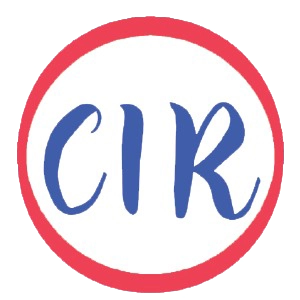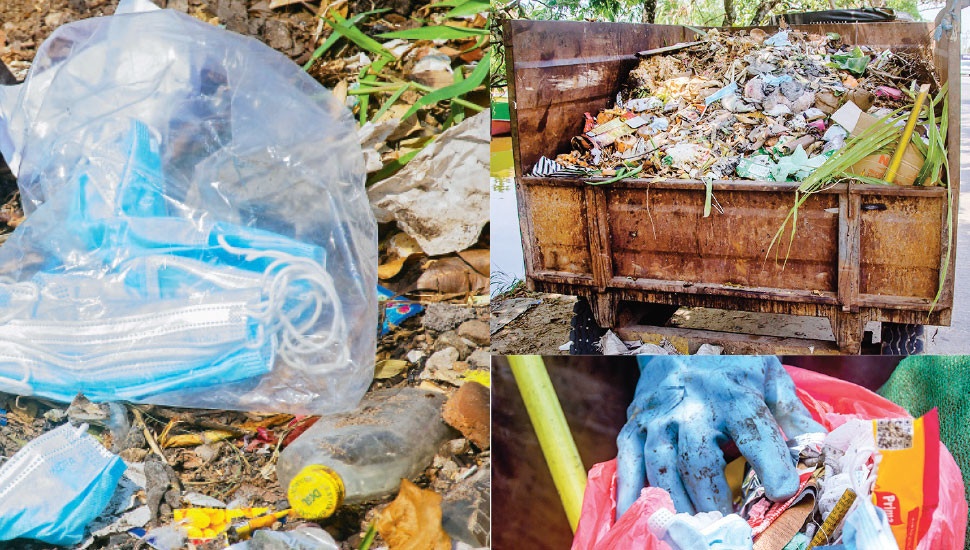By Thameenah Razeek
Chandrapala (not his real name) is in his mid-forties and has been rotated to at least 20 trucks and tractors carrying garbage in the last 24 months as a punishment, merely because he refused to load a stock of used face masks dumped with unsorted garbage disposed from the residence of a local government politician in the constituency. He makes at least four trips daily to Kerawalapitiya Garbage Dump with three garbage collectors on-board the truck. All three of them, who manually collect garbage, contracted Covid-19 three times in short intervals within the past 12 months, with the exception of Chandrapala.
“Normally, you are assigned to one truck. I was rotated because I refused to load haphazardly disposed garbage from a Pradeshiya Sabha member. Initially, we were equipped with facilities to disinfect garbage, especially non-degradable including masks and gloves, before loading them onto the truck. However, now we only wear masks and have no facility to disinfect garbage bags from residences or offices, even though there are separate days allocated to collect plastics and other items that are not biodegradable. Unfortunately, residents no longer take time to separate their garbage and often face masks and gloves are disposed in the same garbage bag where biodegradable garbage is put,” he said.
Approximately 20 garbage tractors arrive in Kerawalapitiya with unsorted waste between 11:00 a.m. and 12:30 p.m. on weekdays. Each garbage truck carries at least 800 kilogrammes of biodegradable and non-biodegradable waste.
32,000MT of face masks used
Ministry of Environment statistics show that Sri Lankans used approximately eight billion surgical masks during the last 24 months, from early February 2020 to early February 2022. If each face mask weighs 4 grams approximately, this is equivalent to 32,000 metric tonnes of general waste generated over the past 24 months. Considering each garbage truck transports 8 metric tonnes of trash, Sri Lankans have used enough face masks to fill 4,000 garbage trucks in the last 24 months.
Used surgical face masks are unrecyclable according to existing rules and regulations regarding the disposal of surgical face masks because they may be contaminated and could potentially lead to indirect infection and viral transmission if they enter the recycling system.
Faced with the sheer volume of discarded face masks during the pandemic, Sri Lanka’s Ministry of Health and Central Environmental Authority (CEA) attempted to advocate and educate the public on proper face mask disposal through various Media platforms.
The Government of Sri Lanka formulated the ‘Interim Guidelines for Management of Solid Waste Generated by Households and Places under Self-Quarantine due to Covid-19 Outbreak’ in March 2020.
The interim guidelines are prepared in line with the current solid waste management policy, regulation and standards, but provisions have been made to accommodate the specific needs of the health emergency situation prevailing at present, for local authorities in Sri Lanka to manage waste.
The Interim Guidelines for Management of Solid Waste Generated by Households and Places under Self-Quarantine due to Covid-19 Outbreak was issued through Letter No. PL/7/1/18/1 which states the following measures:
The first step of the covid-19 waste management plan is to identify households, places and persons subjected to self-quarantine, and to deliver special services to those places and households. For providing adjusted waste collection services, the local authorities have to allocate the following resources:
• Arrange a separate vehicle for waste collection and transport
• Have an appropriate number of waste handling crews
• Supply appropriate waste collection bags
• Assign public health officers to advise households about on-site disposal, and to train and supervise activities of waste handling by residents and collection crews in the local authority
• Give instructions to the households undergoing self-quarantine not to practise illegal open dumping (stress the possibility of taking legal action against such cases)
• Temporarily stop the acceptance of waste from recycling centres or shops until the Covid-19 pandemic ceases if patients or contamination have been recorded in the designated area
• Temporarily stop the training programmes, site visits and study tours to waste management sites that are being operated by local authority until the Covid-19 pandemic ceases
• Strictly prohibit entry of people and animals to dumpsites and scavenging on waste
• Appoint a responsible officer to implement waste management activities and instruct them to implement these measures with the assistance of other stakeholders
It also emphasises the need of householders making maximum effort to minimise waste generation. Limiting excessive use of packaging materials, tools, utensils, and consumables can support waste minimisation. Households are advised to follow waste reduction guidance and instructions given by the local authority and public health officer. Waste generated from households and the self-quarantine places with Covid-19 positive cases or people who are thought to be infected are guided to separate into a minimum of 3 categories.
• Kitchen and food waste (organic waste)
– Waste generated from food processing, leftover after consumption, spoiled/discarded foods
• Non-biodegradable waste
• Special waste
– Waste and potentially contaminated items such as face masks, gloves, handkerchiefs, tissues, sanitary pads, diapers, and other materials contaminated by body fluids of residents.
It also insists local authorities shall supply appropriate PPE for all persons involved in waste collection, transport, and disposal. The PPE includes special workwear (overalls), masks, gloves, shoes/boots and an apron or disposable work clothing. Sanitary workers should be instructed to use PPE properly and shall be monitored. The waste handlers and supervisors must be suitably briefed and supported regarding the nature of the waste and the necessary safety procedures to support them to carry out their tasks. They should have suitable PPE and on each day of special service a fresh set of PPE must be worn. Overalls can be reused after thorough cleaning and disinfection. It is the responsibility of the local authority to provide necessary PPE.
Unfortunately, after a lapse of almost two years since the pandemic hit the country, both the authorities and the residents appear to have forgotten safety measures, creating several other environmental and health threats in the long run.
Irregular waste dumping poses threats
The Kerawalapitiya Garbage Dump, which spans over nearly 20 acres, has facilities to collect non-biodegradable garbage which they used in generating electricity in Sri Lanka’s first-ever waste-to-energy power plant. The biodegradable waste is used in making organic fertiliser.
The garbage dump is in close proximity to Hamilton Canal and spreads across a land area that has about 400 families living in the vicinity.
“The garbage dump is creating many issues for us. Apart from the stench that emanates from it, all kinds of hazardous waste including PPE kits and face masks ended up in our gardens and households a few times during the rainy season in the last two years as the whole area gets flooded and our houses go underwater. We are scared of our groundwater getting contaminated as we have seen these face masks and PPEs being dumped into a huge pit dug to create compost,” Ranjani, a resident of the area claimed.
Ironically, the residents who fear water resources being contaminated and viruses being spread due to face masks and PPEs being dumped irregularly, admitted handing over unsorted waste to garbage trucks.
Waste collectors claimed that they were left with no choice but to collect, transport and dump non-segregated waste in the garbage dump even at the risk of their own health, fearing they would come under the guillotine of authorities who clearly pay no attention to guidelines.
Wattala Pradeshiya Sabha Chairman Thyagarathne Alwis claimed that at the peak of Covid-19, garbage truck operators were instructed to collect waste in 300 micrometre leak-proof yellow bags and if such bags are not available, a yellow colour plastic strip or a piece of cloth should be attached or tied to enable identification of the special waste bag from a distance.
He, however, admitted that the instructions are no longer being followed because Covid-19 has become “common” and the use of face masks has increased.
When asked why the Wattala Pradeshiya Sabha has stopped monitoring whether these guidelines are followed, he said it is impractical and not only the Wattala PS, but also other local government bodies are not following those guidelines.
According to CEA Director General, Hemantha Jayasinghe, they are only empowered to issue guidelines, but not in a position to take legal action against those who violate the guidelines.
“Even if we take unsorted waste and dump it in the compost pit, no one, including the site officers are bothered about it. The plastics and polythene are given to a waste-to-energy power plant run by a non-state power company manned by the Chinese. However, no used face masks will be given to this plant,” Chandrapala said.
Acknowledged, but no action
However, both Jayasinghe and Minister of Environment Mahinda Amaraweera acknowledged that guidelines are not being followed, despite directives being issued. Jayasinghe said issuing guidelines for the safe disposal of face masks in particular and personal protective equipment (PPE) in general, is more important than ever.
“While guidelines for proper medical waste disposal are available in Sri Lankan healthcare settings, guidelines for proper face mask disposal are either unavailable or have not reached communities effectively. Laws prohibiting the improper disposal of used personal protective equipment (PPE) could also help to alleviate the problem. Individuals’ practices regarding improper face mask disposal must be closely monitored by the Police and other law enforcement agencies in every corner of the city. Those who break the law must face the appropriate punishment,” he said.
He also said it is critical to train people in good habits and to conduct awareness campaigns, because laws will go unheeded if the necessary infrastructure is not in place to make such tasks easy for people to carry out.
Where do used face masks end up?
Ceylon Today visited households near Hamilton Canal in the vicinity of the Kerawalapitiya Garbage Dump, and it was revealed that garbage tractors come to the area only twice a week, collecting non-degradable waste such as polythene and plastics on one day and degradable waste on the other day.
However, a majority of families admitted to incinerating their own waste, including face masks, in their backyards.
Boat owners, who had moored their boats in the canal, said they have seen people throwing garbage into the canal at night, as garbage trucks do not come.
When asked why garbage collectors don’t come daily, they said they are overwhelmed with the volume of garbage.
“We have seen face masks and other garbage floating in this lake. However, we do not collect them because it is not our responsibility. It is in the water, and we don’t have enough employees or time to get into the water and clean it up. Why should we bother if the area Environmental Police Officers don’t care about the environment or the rule of law?” another garbage collector lamented.
However, the Environmental Unit of the Wattala Police denied these claims and said they take every measure to clean the canal.
Pix by Kelum Chamara
This story was produced as part of a journalism fellowship under CIR’s ‘Stories from the Margins” initiative supported by the Earth Journalism Network (EJN) and Internews. It was originally published in Ceylon Today Newspaper.




